Apple's Self Repair Program was never going to be what repair advocates wanted
Apple's Self Service Repair program isn't a perfect solution that addresses all of the concerns from the Right to Repair movement. It was never meant to be.
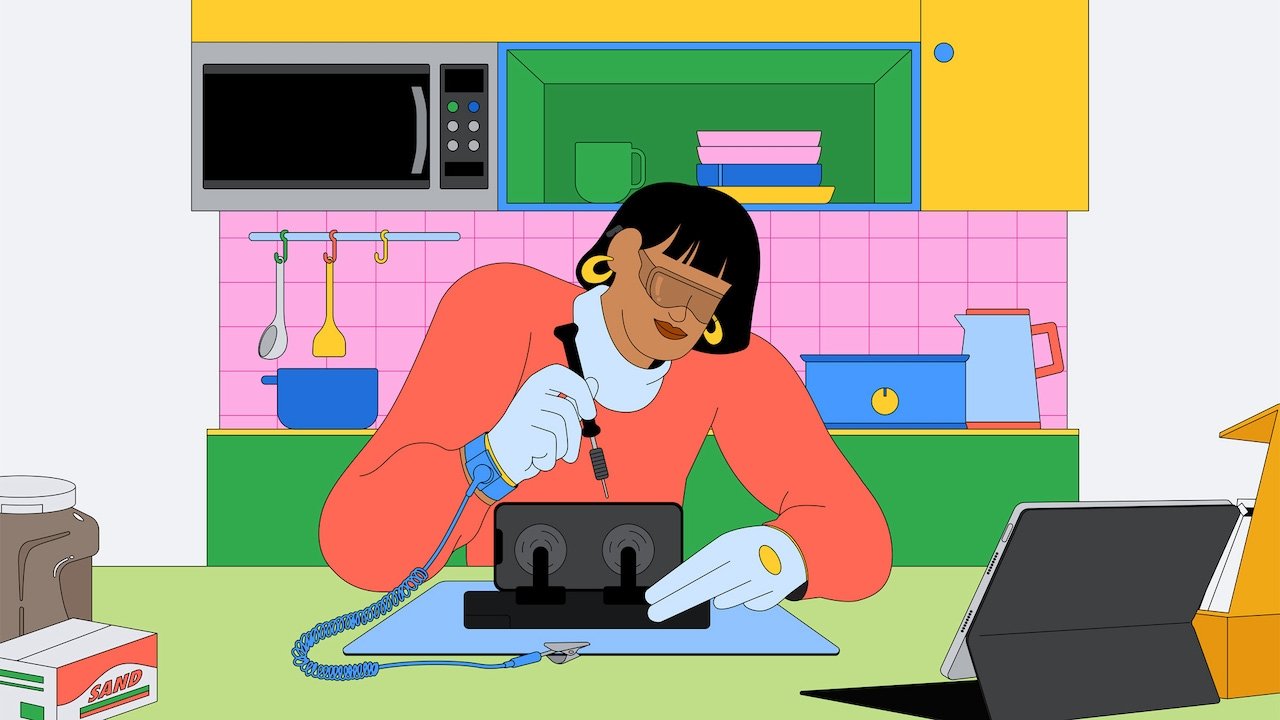
Credit: Apple
The iPhone maker launched the Self Service Repair portal in April, allowing customers to order parts, tools, and other resources to repair their own devices.
This move marked a turning point for Apple -- a company that has long shied away from making it easy for users to repair their own devices. While some repair advocates have praised Apple's move, others have criticized it as being too difficult and expensive.
Whether those criticisms are valid or not, it's important to keep in mind that the Self Service Repair program is a concession, not a heel turn. Here's why.
Through the new repair portal, users can order parts for a number of iPhone models to carry out standard repairs like battery swaps, speaker replacements, and display fixes. The portal also offers tool kits that are available to purchase or rent for a specific period of time.
Along with the tools and parts, Apple also made available a plethora of different repair manuals and technical documentation for use at home.
However, many organizations that advocate for the Right to Repair had mixed feelings about the program.
The repair experts at iFixit, for example, praised the program because "anything that enables more people to do repairs is great news." However, it criticized the fact that Apple is still pairing parts, which it said enables only "very limited" repairs.
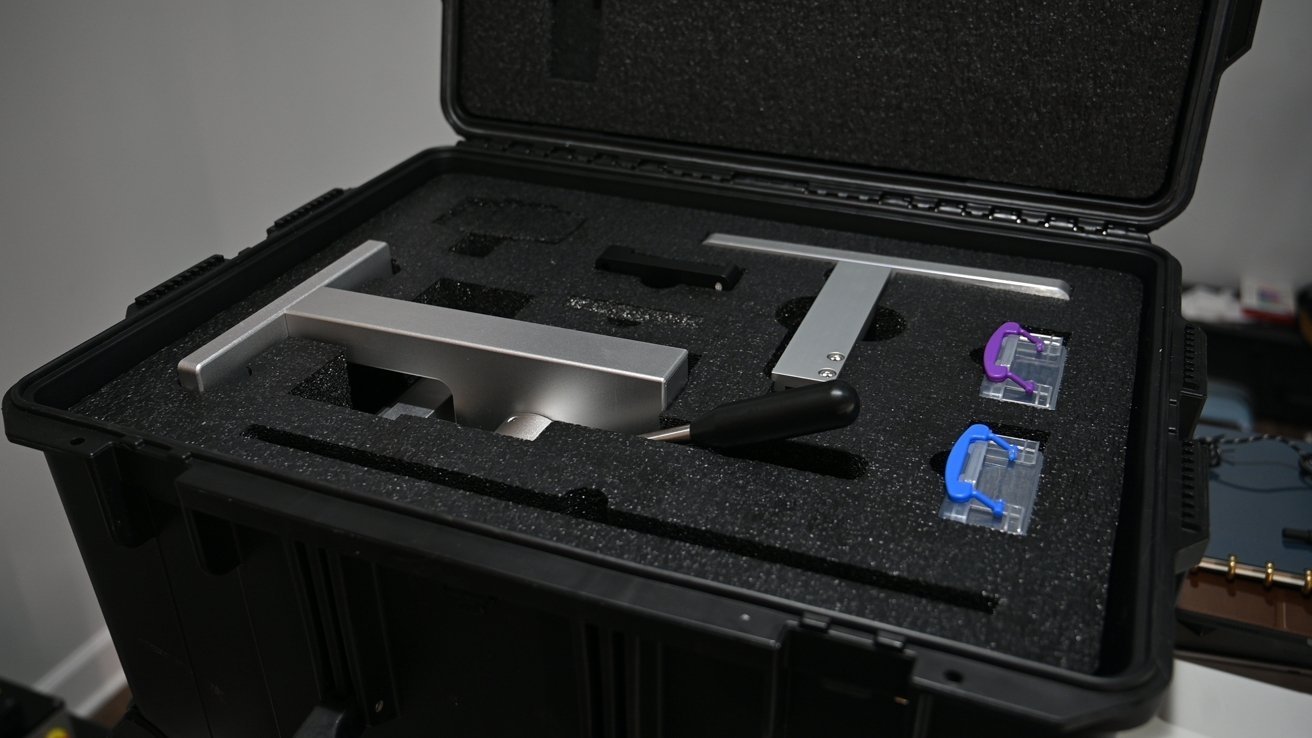
A look at an Apple repair toolkit.
The U.S. Public Research Interest Group, which has criticized Apple in the past for its repair policies, was even less forgiving.
U.S. PIRG director Nathan Proctor said the program is a sign that Right to Repair is "breaking through," but noted that Apple is still making customers jump through "too many hoops" to repair their devices.
"We should have more options. Not just one set of parts. Not just a few manufacturers," he said. "No product should be tossed in the scrap heap, wasting money and adding to our toxic electronic waste problem, because the manufacturer doesn't properly support repair
Apple has effectively lobbied against Right to Repair legislation in a slew of different states. Back in 2019, for example, California tabled a Right to Repair bill after immense pressure from Apple and other companies.
The company makes a few different arguments in its fight against Right to Repair. For one, it believes that there's a safety issue. Consumers could very well hurt themselves when repairing their own devices. Apple claims that many repairs are "too complex" for untrained customers.
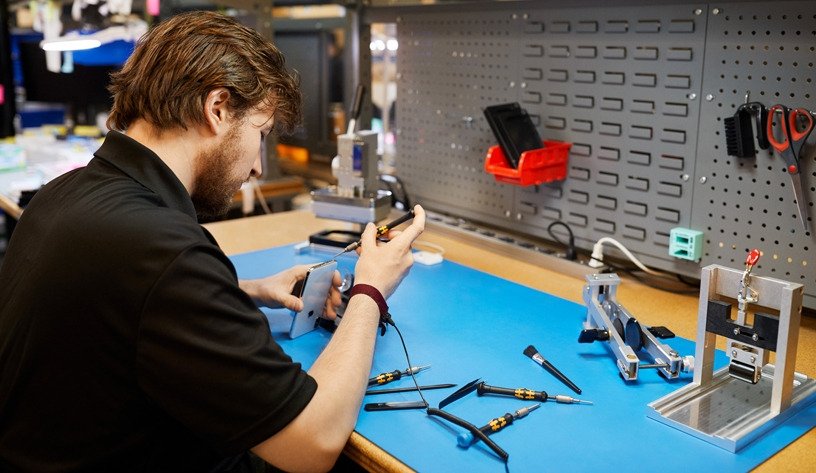
Apple has long fought Right to Repair legislation.
In other cases, Apple has taken a security argument. According to Apple, opening up its devices to repair could threaten the iPhone's strong emphasis on security. Back in 2017, when lobbying against a Right to Repair bill in Nebraska, Apple said the state could become a "Mecca for bad actors" if the bill passed.
Apple has taken steps to loosen its grip on device repairs in recent years, however. It has launched independent repair provider programs that expand access to device repairs. However, there have been complaints that the program's terms are still too restrictive.
Given Apple's history, the launch of the Self Service Repair program -- imperfect as it may be -- seems uncharacteristic for Apple. However, there's a reason for that.
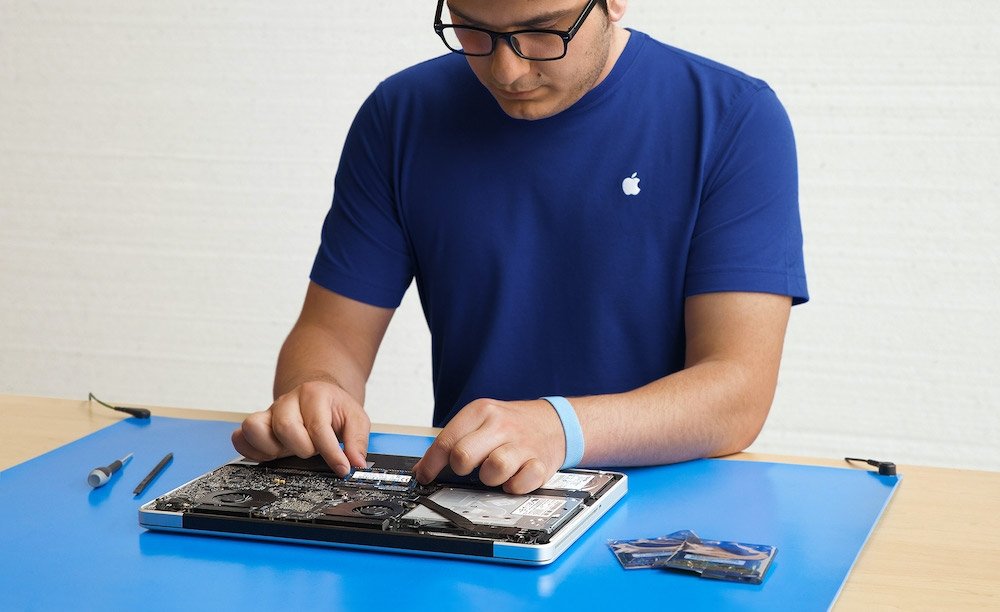
Apple is facing Right to Repair pressure in multiple markets.
Back in February 2022, U.S. lawmakers introduced Right to Repair legislation that would enshrine in law the ability for consumers to fix their own products. Apple has fought Right to Repair legislation at the state level, but a federal battle may be more precarious for the company.
There's regulatory pressure, too. The U.S. Federal Trade Commission, for example, has pledged to take a formal stand against unlawful repair restrictions. Even without legislation, there's a chance Apple could be hit by a regulatory action from the FTC.
Those pressures are just the ones in the U.S. The European Union, in addition to charing ahead with antitrust legislation, is also backing new rules around Right to Repair. In 2022, the EU voted to support the rights of consumers to repair their own products.
All of this is to say that Apple's Self Service Repair program isn't a result of a reversal in its beliefs surrounding repairs. Instead, the program is undoubtedly a preemptive initiative to get ahead of Right to Repair legislation.
That's why the program isn't perfect. Apple isn't suddenly supporting the widest definitions of Right to Repair. It still wants to maintain control over its product repairs, it's just avoiding regulatory action down the road. Hence, the doubling-down on parts pairing and other restrictive policies.
This is made more complicated by the fact that Right to Repair still doesn't have a clear and effective definition. While the program could meet the requirements of some legislative actions, it might not meet the requirements of others. By implementing the program the way it did, Apple was probably hedging its bets based on current information.
Whether or not you the reader approve or disapprove of it, or we do, this is what Apple has done. As with anything else, opinions vary.
But, even if Apple's intentions don't align with the Right to Repair movement, it's still a positive step. The Self Service Repair program is currently available for iPhone fixes. In the future, it'll launch for Macs and will expand to the European market.
At this point, it would be hard for Right to Repair advocates to argue that the Self Service Repair program isn't a move in the right direction, no matter what Apple's intentions are -- and only they know for sure what they have planned, or what their stopping points are.
Even though what's been seen so far is more restrictive than the loudest advocates would like, the availability of parts and resources does make it easier for people to fix Apple products. Those tools, parts, and resources aren't just available to consumers either. Small repair shops can now get access to easy-to-follow guides and the same tools used by Apple technicians without agreeing to the onerous terms of the Independent Repair Provider Program.
And given the fact that electronic waste is a significant -- and growing -- problem, any effort to make products more repairable is a positive step.
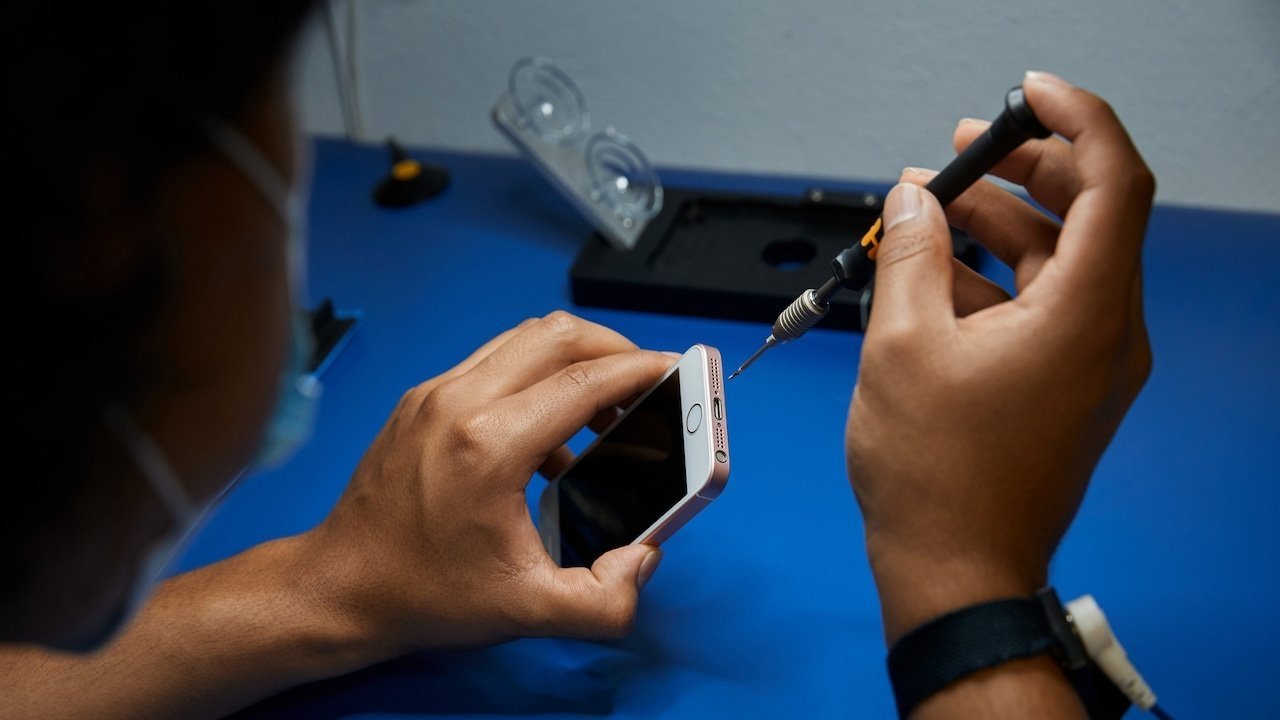
Despite its flaws, it's hard to argue that this isn't a positive step.
Looking beyond Right to Repair arguments, it's also important to note the balance Apple has struck here. While Apple devices are not casually repairable, Apple does design products for durability.
Things like glue and tight design tolerances make devices more durable, but less repairable. While on the average, regular AppleInsider readers are more technically proficient than the average iPhone owner, keeping the average unskilled consumer out of a device protects it from probing fingers that don't know what to do, or think the iPhone is built on the same scale as that Blue and White G3 that they opened two decades ago.
Design is a balance. To placate arguments that are vague, undefined, and, in some cases, unrealistic, Apple is never going to make an iPhone with a casually removable battery like a 2006 Nokia.
To many Right to Repair advocates, the Self Service Repair program isn't perfect. They're right. It was never meant to be a perfect solution to Right to Repair arguments.
Apple's Self Service Repair program was intended to get ahead of legislation and regulation. But, it's still a positive step forward that happens to be a good balance between the durability of Apple's design and the repairability of its products.
Whether the company makes that many more steps in the right direction and what direction actually is, are the real questions.
Read on AppleInsider

Credit: Apple
The iPhone maker launched the Self Service Repair portal in April, allowing customers to order parts, tools, and other resources to repair their own devices.
This move marked a turning point for Apple -- a company that has long shied away from making it easy for users to repair their own devices. While some repair advocates have praised Apple's move, others have criticized it as being too difficult and expensive.
Whether those criticisms are valid or not, it's important to keep in mind that the Self Service Repair program is a concession, not a heel turn. Here's why.
The Self Service Repair program
Apple first announced the Self Service Repair program in November 2021, surprising regular consumers, repair advocates, and the broader tech industry alike. The program actually launched on April 27, 2022.Through the new repair portal, users can order parts for a number of iPhone models to carry out standard repairs like battery swaps, speaker replacements, and display fixes. The portal also offers tool kits that are available to purchase or rent for a specific period of time.
Along with the tools and parts, Apple also made available a plethora of different repair manuals and technical documentation for use at home.
However, many organizations that advocate for the Right to Repair had mixed feelings about the program.
The repair experts at iFixit, for example, praised the program because "anything that enables more people to do repairs is great news." However, it criticized the fact that Apple is still pairing parts, which it said enables only "very limited" repairs.

A look at an Apple repair toolkit.
The U.S. Public Research Interest Group, which has criticized Apple in the past for its repair policies, was even less forgiving.
U.S. PIRG director Nathan Proctor said the program is a sign that Right to Repair is "breaking through," but noted that Apple is still making customers jump through "too many hoops" to repair their devices.
"We should have more options. Not just one set of parts. Not just a few manufacturers," he said. "No product should be tossed in the scrap heap, wasting money and adding to our toxic electronic waste problem, because the manufacturer doesn't properly support repair
Apple's history with right to repair
Despite the criticisms, it's hard to deny that Apple's Right to Repair program is a reversal of its previous policies on the subject. Apple has long fought against Right to Repair anywhere that it popped up.Apple has effectively lobbied against Right to Repair legislation in a slew of different states. Back in 2019, for example, California tabled a Right to Repair bill after immense pressure from Apple and other companies.
The company makes a few different arguments in its fight against Right to Repair. For one, it believes that there's a safety issue. Consumers could very well hurt themselves when repairing their own devices. Apple claims that many repairs are "too complex" for untrained customers.

Apple has long fought Right to Repair legislation.
In other cases, Apple has taken a security argument. According to Apple, opening up its devices to repair could threaten the iPhone's strong emphasis on security. Back in 2017, when lobbying against a Right to Repair bill in Nebraska, Apple said the state could become a "Mecca for bad actors" if the bill passed.
Apple has taken steps to loosen its grip on device repairs in recent years, however. It has launched independent repair provider programs that expand access to device repairs. However, there have been complaints that the program's terms are still too restrictive.
Given Apple's history, the launch of the Self Service Repair program -- imperfect as it may be -- seems uncharacteristic for Apple. However, there's a reason for that.
Storm clouds ahead
In the future, Apple will most likely be forced by some piece of legislation to provide repair resources, tools, and parts to consumers. The company has effectively battled Right to Repair legislation, but given the popular and governmental support for the movement, it will probably lose the war.
Apple is facing Right to Repair pressure in multiple markets.
Back in February 2022, U.S. lawmakers introduced Right to Repair legislation that would enshrine in law the ability for consumers to fix their own products. Apple has fought Right to Repair legislation at the state level, but a federal battle may be more precarious for the company.
There's regulatory pressure, too. The U.S. Federal Trade Commission, for example, has pledged to take a formal stand against unlawful repair restrictions. Even without legislation, there's a chance Apple could be hit by a regulatory action from the FTC.
Those pressures are just the ones in the U.S. The European Union, in addition to charing ahead with antitrust legislation, is also backing new rules around Right to Repair. In 2022, the EU voted to support the rights of consumers to repair their own products.
All of this is to say that Apple's Self Service Repair program isn't a result of a reversal in its beliefs surrounding repairs. Instead, the program is undoubtedly a preemptive initiative to get ahead of Right to Repair legislation.
That's why the program isn't perfect. Apple isn't suddenly supporting the widest definitions of Right to Repair. It still wants to maintain control over its product repairs, it's just avoiding regulatory action down the road. Hence, the doubling-down on parts pairing and other restrictive policies.
This is made more complicated by the fact that Right to Repair still doesn't have a clear and effective definition. While the program could meet the requirements of some legislative actions, it might not meet the requirements of others. By implementing the program the way it did, Apple was probably hedging its bets based on current information.
A positive first step
This isn't about binary approval or disapproval of what Apple has done, or the same for any faction of the Right to Repair movement. For the first time, Apple is giving relatively skilled folks that want it a crack at renting tools to do a repair, and get the repair done at home.Whether or not you the reader approve or disapprove of it, or we do, this is what Apple has done. As with anything else, opinions vary.
But, even if Apple's intentions don't align with the Right to Repair movement, it's still a positive step. The Self Service Repair program is currently available for iPhone fixes. In the future, it'll launch for Macs and will expand to the European market.
At this point, it would be hard for Right to Repair advocates to argue that the Self Service Repair program isn't a move in the right direction, no matter what Apple's intentions are -- and only they know for sure what they have planned, or what their stopping points are.
Even though what's been seen so far is more restrictive than the loudest advocates would like, the availability of parts and resources does make it easier for people to fix Apple products. Those tools, parts, and resources aren't just available to consumers either. Small repair shops can now get access to easy-to-follow guides and the same tools used by Apple technicians without agreeing to the onerous terms of the Independent Repair Provider Program.
And given the fact that electronic waste is a significant -- and growing -- problem, any effort to make products more repairable is a positive step.

Despite its flaws, it's hard to argue that this isn't a positive step.
Looking beyond Right to Repair arguments, it's also important to note the balance Apple has struck here. While Apple devices are not casually repairable, Apple does design products for durability.
Things like glue and tight design tolerances make devices more durable, but less repairable. While on the average, regular AppleInsider readers are more technically proficient than the average iPhone owner, keeping the average unskilled consumer out of a device protects it from probing fingers that don't know what to do, or think the iPhone is built on the same scale as that Blue and White G3 that they opened two decades ago.
Design is a balance. To placate arguments that are vague, undefined, and, in some cases, unrealistic, Apple is never going to make an iPhone with a casually removable battery like a 2006 Nokia.
To many Right to Repair advocates, the Self Service Repair program isn't perfect. They're right. It was never meant to be a perfect solution to Right to Repair arguments.
Apple's Self Service Repair program was intended to get ahead of legislation and regulation. But, it's still a positive step forward that happens to be a good balance between the durability of Apple's design and the repairability of its products.
Whether the company makes that many more steps in the right direction and what direction actually is, are the real questions.
Read on AppleInsider

Comments
As it stands, the iPhone will refuse to fully work with replacement parts unless Apple blesses the replacement. That won't happen once Apple drops support.
At some point, Apple will stop issuing software updates to fix crucial security issues. That wouldn't be an issue except that Apple prevents me from installing a third party OS (for example Linux or Android).
I would be much happier if Apple opened up repairs and software once they stopped supporting a device.
Remember, Apple Silicon Macs, iPhones, and iPads are all tied to the owner's Apple ID. At the very least, they should allow the registered Apple ID to approve pairing of replacement parts. I'm OK with it giving a warning if someone swaps the fingerprint sensor, or makes hardware/software alternations without my approval. However, as the registered Apple ID for the device, I should be able to approve those changes.
Car repairs happen all the time.
And I haven't had to repair an iPhone much past the iPhone 6.
If I had the choice of saving $200 repairing an iPhone or paying Apple $200 to fix an iPhone, I would gladly hand my credit card over to Apple for a trained, experienced technician with ALL of the proper equipment to do the job right.
The EV future is even more removed from the you fix it era.
…false premise. Besides having always been repairable, no need to toss broken iPhones into landfill. Simply bring to a store (or mail in for free) where Apple will recycle responsibly. Been doing it with devices for years.
Apple's Self Repair Program was never going to be what repair advocates wanted
No shit, Sherlock. For the repair advocates to get what they want would require a complete, from the ground up, redesign of the iPhone and nothing less. The really grinding thing is that the right-to-repair advocates are such a tiny minority to kowtow to. How many people, if their 4KHDTV, 4KBD Player, AVR, HD Projector, etc, are going to dive in and try to repair it? No, you take it to a shop, usually the place you bought it from, for repair or replacement.
My guess is that only 1 in 100 iPhone users would be up for doing their own repairs on and the rest would get Apple or a third party to do the fix. I get that having choices is important but if this is only going to affect 1% of users it is really worth the effort?
P.S. Last repair was MBP 2017 with dead SSD. Total cost of repair is 25$. I think no one will argue, that it’s not posible with original parts.
The EV *companies* are trying to make it that way, but as the successfully Tesla repair shops have shows, it is a manufacturer created wall vs actual inability to fix.
If anything, EV are less complex than ICE, especially in terms of mechanical bits (ie basic elements needed to "limp home")
No valves to time, no plugs to gap, no fuel pumps hidden in gas tanks to fail...